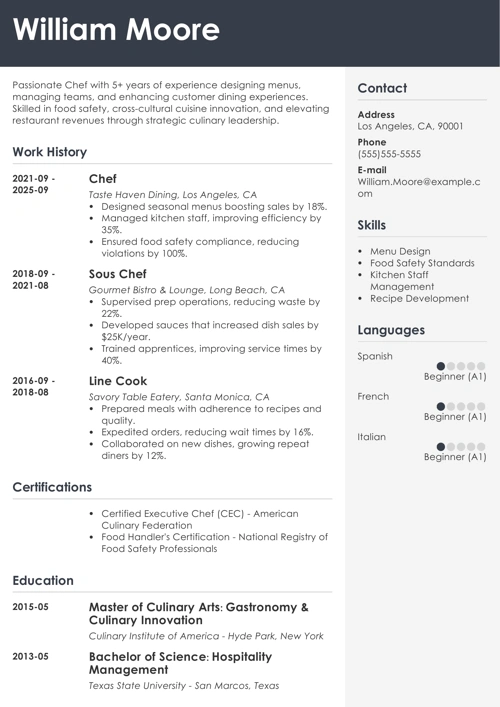Over the course of a lifetime the average American spends more than 90,000 hours at work. And let’s be honest, we end up spending a big chunk of that time shooting the breeze with our colleagues. From discussing the latest Netflix hit to sharing plans for the weekend, there’s nothing like a good chat to help ease the daily grind.
But, no matter how friendly you are with your workmates, some things are better left unsaid. Sex, money, and religion are widely considered unacceptable topics of conversation. But there’s another topic you should probably leave at home as well, and it’s a biggie. Politics.
Whether it’s the presidential election, gun control, global warming, or any other partisan issue it can be hard to avoid politics while you’re on the clock, even if the conversations get intense. So how willing are people to get political? To find out, we surveyed over 1,000 people about their political discussions at work, the most common topics of conversation, and the consequences of being open about politics. Read on to find out what we discovered.
Controversial Conversations
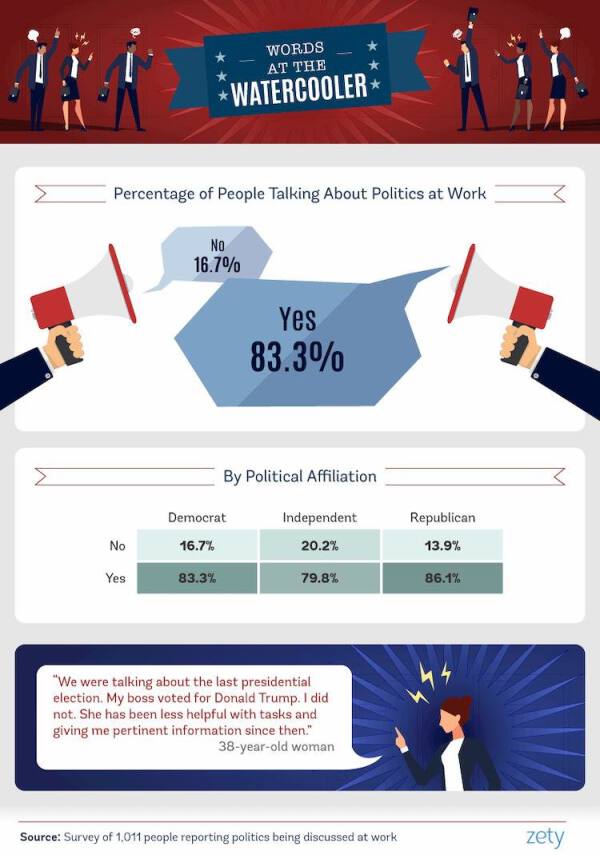
One recent example is Coinbase, a San Francisco based digital currency exchange. With an annual revenue of more than $500m and over 1000 employees it’s a major player in the cryptocurrency industry. And like any company, it isn’t immune to the impact of politics at work.
In October 2021, CEO Brian Armstrong announced a policy curbing political activism within the company. He noted there was pressure to become more outspoken on issues of social justice, and stated the following in a blog post:
"While I think these efforts are well-intentioned, they have the potential to destroy a lot of value at most companies, both by being a distraction, and by creating internal division. We've seen what internal strife at companies like Google and Facebook can do to productivity. I believe most employees don't want to work in these divisive environments.”
The announcement caused a backlash on social media and Armstrong offered a generous severance package to those who didn’t agree with the policy. Around 5% of the company’s headcount took him up on that offer. So pressure to be political does have consequences.
But it’s fair to say that the biggest reason not to let these hot-button issues play out in the office is today’s fraught political climate. Most political experts agree that Americans are more divided than ever by party lines. It’s a phenomenon known as “political polarization.” As the Pew Research Center describes it, “the vast and growing gap between liberals and conservatives, Republicans and Democrats.” So even if you think you’re bringing up a topic in a completely innocent way, you could find someone vehemently opposed to your views and set them off in a big way.
The impact of polarization can be hugely damaging to the functioning of a successful workplace. Research shows that political differences actually make us more likely to demonize those holding opposing views. It’s the sort of division and resentment that can be incredibly damaging to an effective and cohesive team. Not to mention damaging individual career prospects for those who are seen as being on the “wrong” side by their managers.
And that’s not just idle speculation. HR professionals have noted the increasing levels of conflict and division. As Julia Moore, a Massachusetts-based employment attorney notes in SHRM’s HR Magazine:
“I’ve never seen it so divisive as it is right now. I’ve seen people who’ve really had to avoid conversations [with co-workers] because their political views are so diametrically opposite. It leads to bullying in the workplace.”
And that division can spill over into open conflict. As Gregory A. Hearing, a Florida-based management-side employment lawyer notes in the same piece:
“I’ve had people get into fights. They just bait each other.”
Then on the other side of the country, an incident was covered in an Anchorage Daily News workplace issues column involving employees getting into a physical fight, triggered by the wearing of American flag emblazoned face masks. This comes as no surprise in the current political climate, as the author of the column, Lynne Curry, states:
“We face the most contentious election in history. Conversations about candidates quickly escalate into sharply polarized verbal duels. Many have lost the ability to respectfully talk with and only talk at each other. Even after the elections, different views on the pandemic, gun rights, white supremacists and Black Lives Matter may continue to incite inflammatory discussions.”
As to our own findings, roughly 83 percent of people admitted to having political conversations at work. Almost 17 percent managed to steer clear of these controversial discussions and self-identified Republicans were slightly more inclined toward discussing politics in the workplace. So in the majority of workplaces these discussions are occurring, bringing with them all the associated risks of conflict and division.
Everyone Has an Opinion
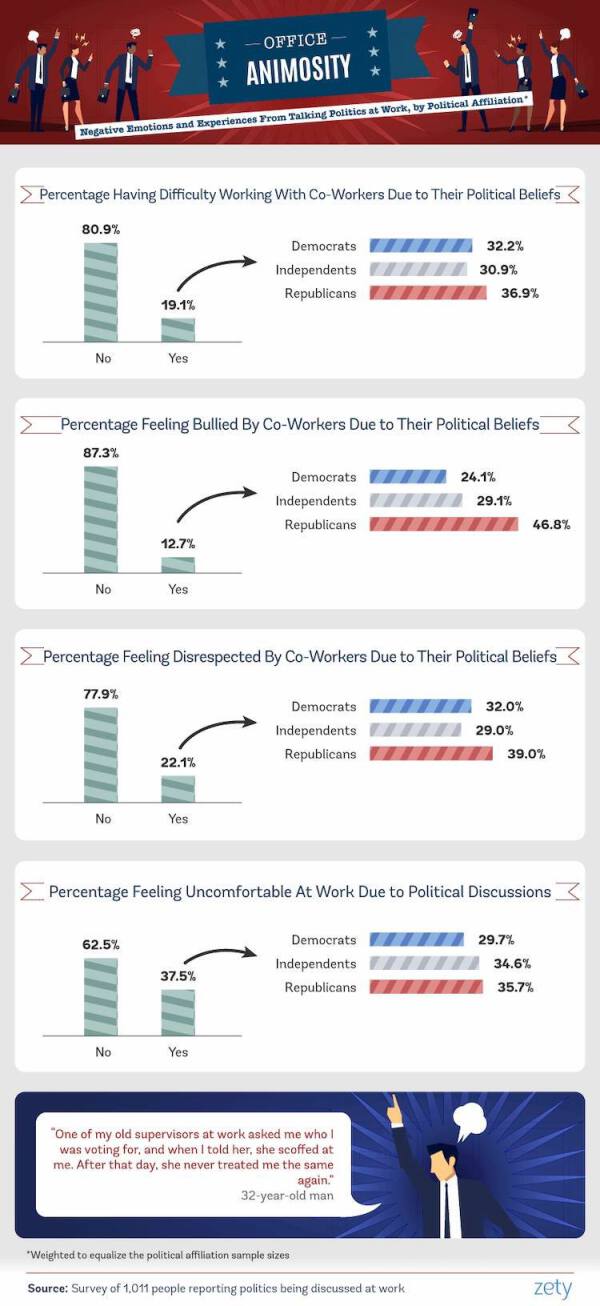
So why do so many people end up breaking the taboo around discussing politics at work? It could be as simple as the fact that these days, pretty much everyone has an opinion. And while most people won’t get riled about relatively sedate issues like international trade negotiations, they can’t help but take the bait when certain buzzworthy topics come into play.
Interestingly a Glassdoor survey revealed that 60% of employees believed discussing politics at work was unacceptable. The same number also believed discussing politics at work could damage their career prospects. So we know it’s wrong, but the power of our strongly held opinions seems to override our caution.
In our survey, employees said debates about the president came up the most often at work. With controversy surrounding everything about his behavior and policies, it’s no wonder nearly 4 out of 5 people said Donald Trump came up in conversation while on the clock. And roughly 47 percent of people also said discussions about the president caused the most workplace tension. In the shadow of one the most divisive presidential election campaigns in history, you can be sure this is a topic to avoid if you want to keep it civil.
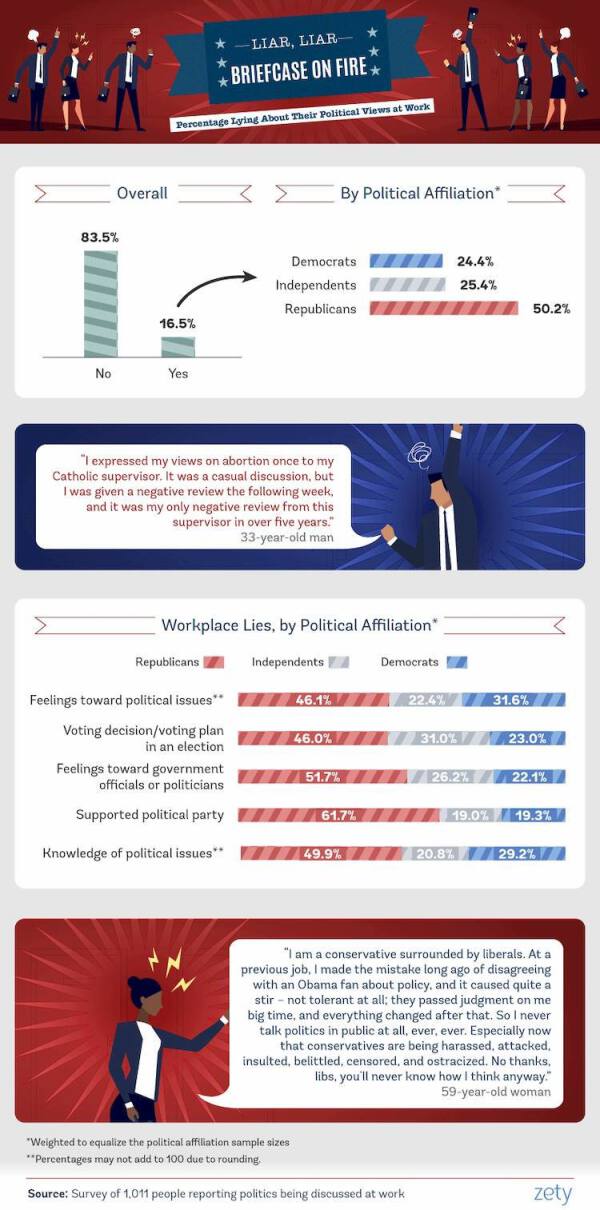
Other hot-button issues cause tension too, and can prove to be a distraction when minds should be focused on work-related matters. Nearly 65 percent of people said gun control had been a topic of discussion at work, followed by racism (58 percent), gender equality (42 percent), and police brutality (almost 42 percent). Whether it’s a mass shooting incident, or instances like the St Louis couple who pointed firearms at protesters marching against racial injustice, gun control is certainly a topic that’s hard to avoid. It was also the issue that caused the most tension between co-workers.
Keeping It Kosher
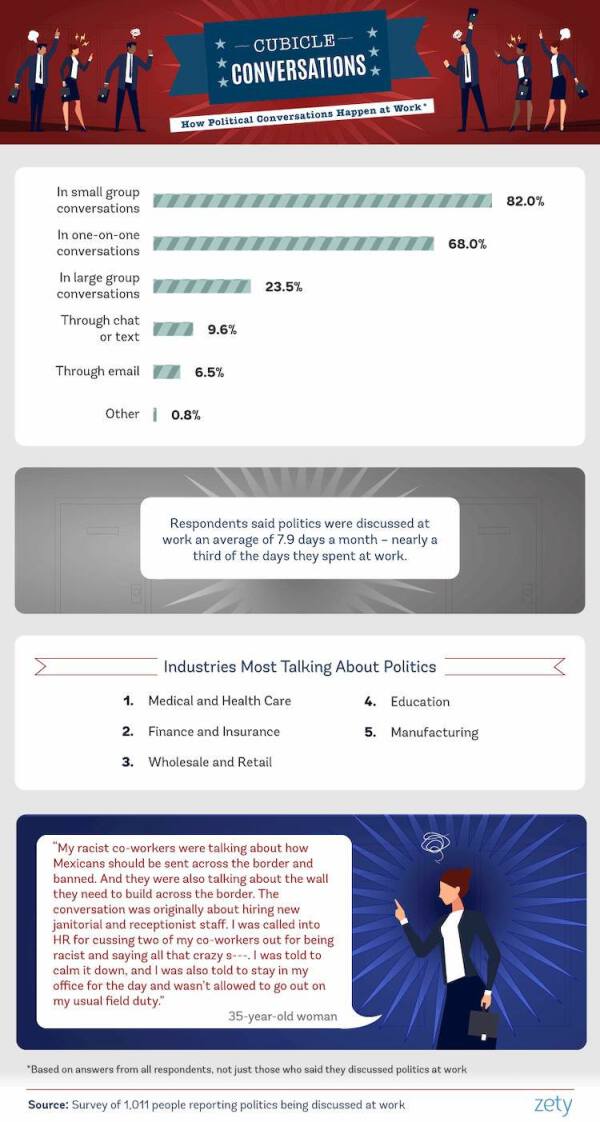
Political conversations at work happen a lot. On average, respondents said political discussions occurred almost eight days a month—accounting for more than a third of days spent in the office.
What doesn’t often occur though are grand town hall style political debates in large groups. In most cases, political debates between colleagues took place in small groups (82 percent) or one-on-one (68 percent), with big group conversations accounting for about 24%.
And political debate isn’t always carried out in person. Just under 10 percent of people said they used instant messaging services like Slack to keep their political discourse going, with just under 7% using email.
Private Opinions
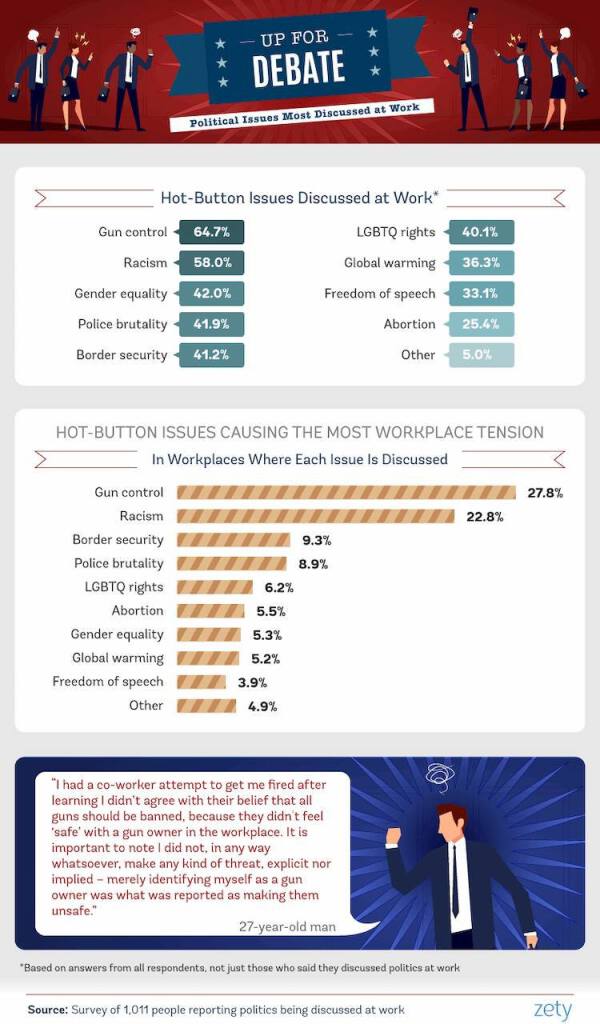
Arguably one of the most important reasons for leaving your political opinions at home is the potential for discrimination. Most states have laws prohibiting companies from firing employees based on their political beliefs, that doesn’t mean you won’t be treated differently if you nail your colors to the mast. So, do the potential consequences prompt people to hide their views?
We found that less than 17 percent of employees felt compelled to lie about their political views at work, but those feelings of concealment were much more common in Republicans. Roughly half of self-identified Republicans felt it was better to lie about their views.
When asked whether they’d lied about how much they supported their party, how they felt about certain politicians, whether they were planning on voting, or how much they knew about a particular issue, Republicans were far more likely to lie to their co-workers than any other political affiliation.
And real-life incidents seem to support that reluctance. In such a heated climate, feelings toward the Trump administration have affected the people who work for the president and his supporters. White House press secretary Sarah Huckabee Sanders was famously asked to leave a restaurant in June 2018 because she worked for President Trump, but ordinary people have been affected too. A landlord in Colorado refused to rent to a tenant who was a Trump supporter, and numerous reports have emerged of people being attacked for wearing a “MAGA” hat in public. A notable recent incident involved a 77-year-old military veteran being physically assaulted for donning the famous red cap.
The Impact of Being Political
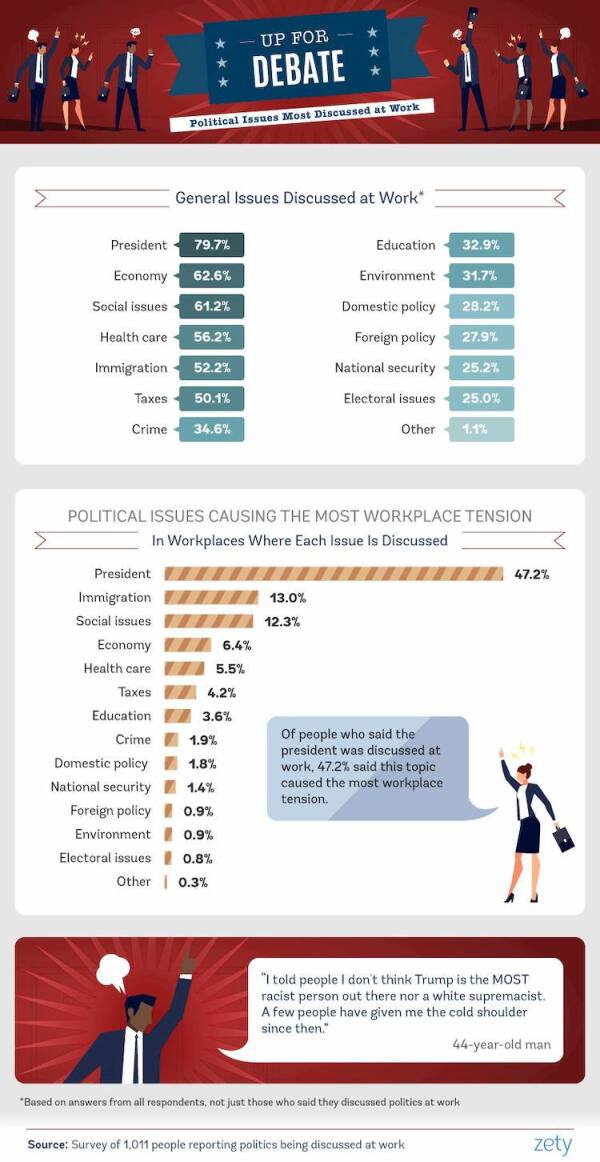
When it comes to business success, company culture matters. Research shows that when happy employees are more likely to be good at their jobs, have increased productivity, feel more creative, and inspire their co-workers to feel the same. Political conversations can have the opposite effect, and political depression is now a recognized phenomenon. So all that partisan back-and-forth can have a direct impact on mood, with knock-on effects on productivity.
More than 1 in 3 of our respondents said they felt uncomfortable at work as a result of the political discussions. This was more prevalent among Republicans (around 36 percent) than Democrat (around 30 percent) or Independent voters (around 35 percent). Republicans were also more likely to feel disrespected by their co-workers over politics as well. A further 1 in 5 people felt they had difficulty working with their co-workers due to their vocalized political beliefs, and nearly 13 percent reported being bullied because of them.
Conclusion—Better Safe Than Sorry
Most people have an opinion about politics, and the majority of us do discuss politics at work. But as much as you might want to keep that conversation going with co-workers, politics are considered a taboo workplace topic for good reason. From discussing Trump to gun control and virtually everything in between, hot-button political issues are a cause of serious tension in the workplace.
Our obsession with politics can even have serious financial consequences for American businesses. It was calculated that the Brett Kavanaugh nomination in 2018 cost U.S. employers a whopping $1.76 billion in lost productivity. The mind boggles at the potential impact of the even more controversial and widely discussed 2021 presidential election.
Ultimately, even if you think you have like-minded coworkers there’s a chance some won’t entirely agree with your feelings. Whether it’s from fear of retaliation, harassment or discrimination, political conversations can leave people feeling disrespected, uncomfortable, or even bullied.
So how to manage this sensitive issue? The first line of defense for leaders could be to set a framework for discussion rather than shut down debate entirely. As Sarah O’Neill, an SHRM-SCP certified HR Director notes in an article for Forbes:
“It’s easy to be sucked into the blue or red discussion. Have employees, instead, discuss big-picture concepts, specific ballot measures, or general concerns. Encourage them to talk about how they would be affected by changes in order to help explain why they are concerned about specifics. By keeping the focus on the details, employees can have constructive, educational conversations that help others (even those with opposing views) see their side.”
And Pete Sosnowski, VP of People at BOLD, also sums up the situation nicely.
"Politics evokes strong emotions. Having employees divided into political factions and engaging in heated conversations can completely ruin team integration and make some staff feel disrespected or stressed. When political polarization creeps into the workplace, managers should send a clear message to employees asking them to refrain from any conversations that could prove divisive."
So the key is for leaders to take the initiative, set boundaries and remind workers that they should share opinions with respect. Ultimately, managing difficult conversations is a valuable skill too. So this approach doesn’t just reduce conflict, it helps to create a more capable workforce.
We’ll never be able to avoid politics at work but if discussions are kept civil and employees treat each other with respect, it’s possible to avoid the worst effects of the polarization that continues to blight American society.
Methodology
Using Amazon’s Mechanical Turk, we ran a survey of 1,011 people about their experiences with discussing politics in the workplace. Respondents had to report discussions about politics taking place in their workplace to qualify.
Our respondents were 48.4 percent women and 51.6 percent men. The average age was 35.9 with a standard deviation of 10.
Respondents were asked to identify their political affiliation. The sample sizes for political affiliations were as follows:
- Democrats: 454
- Republicans: 251
- Independents: 248
- Libertarians: 36
- Green Party: 8
- Other: 14
Respondents who identified as Libertarian, Green, or “Other” were excluded from our visualization of the data due to low sample sizes in those groups.
Parts of this project break down data by political affiliation. For these visualizations, we weighted the data to equalize the sample sizes of the various political affiliations.
Questions about political issues being discussed in the workplace were given to all participants. They first reported what issues had been talked about in their workplace, and then they reported which of the issues discussed caused the most tension in their workplace.
Parts of this project concern people who have lied about their political views at work. People had to first report they personally discussed politics at work, rather than just being present when politics were discussed by others.
When asked how political discussions at work were taking place, respondents were able to select all options that applied to them.
Respondents who reported that they had lied about their political beliefs at work were also asked what specifically they lied about. They were able to check all options that replied to them.
The data we’re presenting are based on self-reporting, which can have a number of issues such as selective memory, telescoping, attribution, and exaggeration. Therefore, that should be taken into consideration when reviewing the claims presented.
No statistical tests were run on the data, so all claims within this project are based on means. This content is purely exploration and done for entertainment purposes. Future research on this topic should be performed.
Sources
- Alana Abramson, Teachers Are Overwhelmingly Opposed to Carrying Guns in Schools, Says Survey
- Lois Beckett, White St Louis couple who pointed guns at protesters to face charges
- Brett Samuels, Sanders: Harassment of Trump supporters ‘unacceptable’
- https://denver.cbslocal.com/2016/03/20/grand-junction-apartment-donald-trump/
- Frank Miles, 77-year-old veteran in California attacked for wearing MAGA hat
Fair Use Statement
Know someone who’s experienced the negative consequences of talking politics around the office? Feel free to share this content for any noncommercial reuse. We just ask that you link back to this page so that people can read our full findings. Plus, it gives our contributors credit for their work.
About Us
Find answers with Zety. Learn how to pick a career or write a good cover letter, look at CV examples to decide how to write yours, and find the best resume template to start completing your dream job application
About Zety’s Editorial Process
This article has been reviewed by our editorial team to make sure it follows Zety's editorial guidelines. We’re committed to sharing our expertise and giving you trustworthy career advice tailored to your needs. High-quality content is what brings over 40 million readers to our site every year. But we don't stop there. Our team conducts original research to understand the job market better, and we pride ourselves on being quoted by top universities and prime media outlets from around the world.


